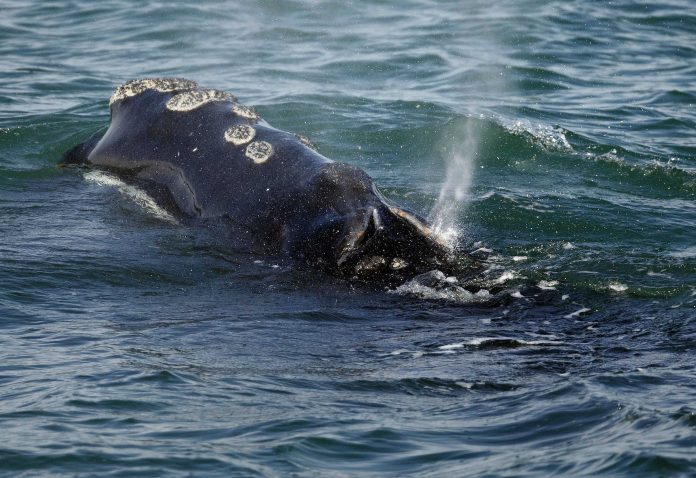
By PHILIP MARCELO
Associated Press
BOSTON (AP) — The construction of dozens of wind turbines off the coast of Nantucket threatens the survival of a dwindling number of endangered Northern Atlantic right whales that inhabit the waters, a group of residents on the affluent resort island in Massachusetts argue in a federal lawsuit filed Wednesday.
ACK Residents Against Turbines said Vineyard Wind’s proposed project of some 60 turbines 14 miles (22 kilometers) south of the island is located in a crucial area for foraging and nursing for the species, which researchers estimate number less than 400.
Mary Chalke, a Nantucket resident and member of the opposition group, said the lawsuit isn’t just about Vineyard Wind, but other turbine projects also in the pipeline up and down the Eastern Seaboard.
“We all want renewable energy,” she said after the group filed the suit in Boston federal court. “This represents the transformation and industrialization of a pristine natural environment.”
The U.S. Bureau of Ocean Energy Management and the National Oceanic and Atmospheric Administration, which are named in the suit, declined to comment, citing the pending litigation. Vineyard Wind, a joint project of a Danish company and a U.S. subsidiary of the Spanish energy giant, Iberdrola, also declined to comment.
But the American Clean Power Association, a group that represents renewable energy companies, stressed the project has undergone a lengthy environmental review, permitting and public comment process.
“It appears this lawsuit is being brought by residents motivated by aesthetic concerns as much as anything alleged in their complaint,” Tom Vinson, a vice president with the association, said in a statement.
Vallorie Oliver, a Nantucket resident, acknowledged that visibility of the towering structures — which could be as tall as 850-feet (260 meters) and eclipse Boston’s 790-foot (240 meter) Hancock Tower — is among the group’s concerns.
But she argues federal officials also haven’t provided adequate research to back up their claims that the wind project will have minimal impact on right whales and other marine life.
“We’re simply asking for real science-based answers to the impact on our natural environment,” she said, speaking with other group members in front of the Massachusetts Statehouse.
Approved in May, the nearly $3 billion, 800-megawatt project would be the first utility-scale wind power development in federal waters. It’s slated to become operational in 2023 and create enough electricity to power 400,000 homes.
The project and Ocean Wind, a proposed 1,100-megawatt offshore wind project off New Jersey, are keystones in the Biden administration’s push to grow offshore wind as a way to fight climate change and create jobs.
The projects could be joined by as many as five other large scale projects totaling more than 2,000 turbines across 2,000 square miles (5,180 square kilometers) of ocean, according to ACK Residents Against Turbines.
Despite the enthusiasm, U.S. offshore wind development is still far behind progress made in Europe. A small wind farm operates near Block Island in waters controlled by the state of Rhode Island, and another small wind farm operates off the coast of Virginia.
The Nantucket group, whose name references the three-letter code for the island’s airport, is the latest effort opposed to large scale wind projects.
Fishermen who ply the lucrative waters from New Bedford, Massachusetts, to Montauk, New York, have long worried about the potential impacts to their livelihood.
Bob Vanasse, who heads the fishing advocacy group Saving Seafood, said Vineyard Wind and other projects proposed in the region could impact a range of significant fisheries, including squid, clams and scallops.
“There are a number of groups in various fisheries who have raised concerns about the insufficiency of the planning and review effort,” he said Wednesday. “This group is far from alone in that.”
Vineyard Wind also comes years after the infamous Cape Wind project, which failed after bitter litigation from another group that included Nantucket property owners.
Supporters of Vineyard Wind have said the newer project is better sited than Cape Wind, which was proposed closer to shore.
Recent wind projects proposed off North Carolina and New York, though, have been pushed farther offshore after environmental concerns were raised, said David Stevenson, of the Caesar Rodney Institute, a Delaware-based group that also opposes wind farm proposals.
He argued that Vineyard Wind’s project should be placed as far as 30 miles (48 kilometers) from shore.
“Fifteen miles was not okay in North Carolina or Long Island, then why is it okay for Nantucket?” Stevenson said. “It’s just wrong.”



















